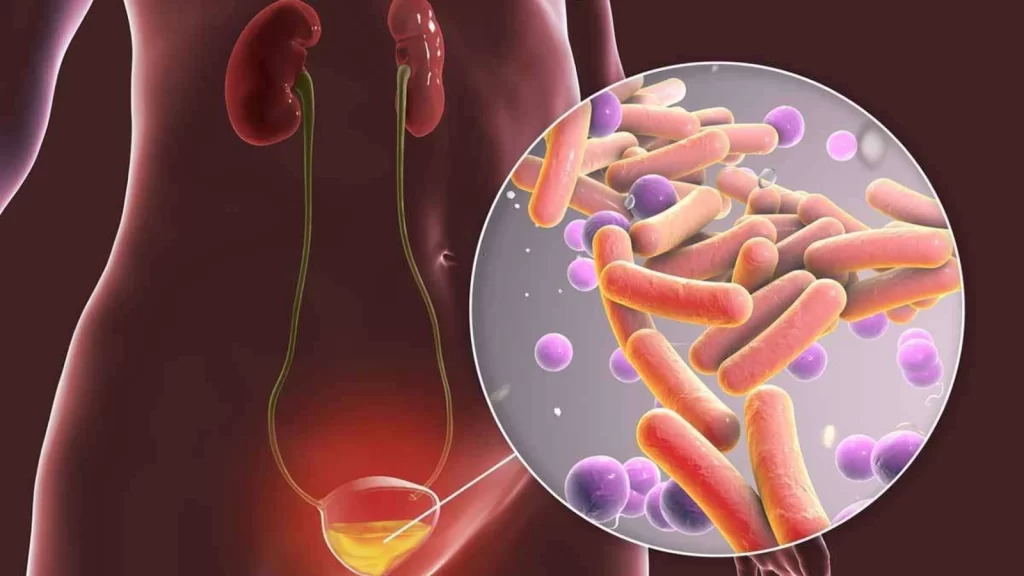Discover the healing power of Ayurvedic treatment for urinary tract infections in Kerala. Experience natural relief and holistic wellness with Samwarthika Ayurveda Hospital.
A UTI is a condition that affects various parts of the urinary tract, including the urethra, ureters, bladder, and kidneys. Common symptoms of UTI include frequent urination, painful urination, and lower back or side pain. Ayurvedic medicines can be effective in treating most UTIs.
Types of UTIs:
There are four primary types of UTIs:
Urethritis (Affects the Urethra): This is an infection that occurs in the urethra, causing symptoms like discharge and a burning sensation during urination.
Cystitis (Affects the Bladder): Cystitis is a bacterial infection that often progresses from the urethra to the bladder. It can lead to symptoms such as frequent urination, painful urination, and cloudy or bloody urine.
Pyelonephritis (Affects Kidneys): Pyelonephritis can result from urinary tract obstruction or kidney infections that spread upwards. Symptoms include fever, chills, nausea, vomiting, and pain in the upper back or sides.
Vaginitis (Affects the Vagina): Vaginitis is a vaginal infection that can also be related to UTIs.

Causes:
A Urinary Tract Infection (UTI) occurs when harmful bacteria enter the urinary system. The most common causes include:
Bacterial Invasion: The vast majority of UTIs are caused by Escherichia coli (E. coli), which naturally resides in the gastrointestinal tract but can migrate to the urinary tract.
Sexual Activity: Intercourse can introduce bacteria into the urethra, increasing the risk of infection, especially in women.
Poor Hygiene: Improper wiping from back to front after using the toilet can transfer bacteria from the anal area to the urethra.
Urinary Retention: Incomplete bladder emptying can create a breeding ground for bacteria.
Weakened Immune System: Conditions such as diabetes or immune disorders can make the body less capable of fighting off infections.
Symptoms:
The symptoms of a UTI can vary but commonly include:
Frequent Urination: A sudden and persistent urge to urinate, even with minimal urine output.
Burning Sensation: A painful, burning sensation during urination.
Cloudy or Bloody Urine: Urine may appear cloudy, bloody, or have a strong, unpleasant odor.
Lower Abdominal Pain: Discomfort or cramping in the lower abdomen or back.
Fatigue and Fever: In more severe cases, UTIs can lead to fatigue, fever, and general malaise.
Prevention:
Preventing UTIs involves adopting healthy habits and practices:
Stay Hydrated: Drinking plenty of water helps flush out bacteria from the urinary tract.
Maintain Good Hygiene: Wipe from front to back after using the toilet, and urinate before and after sexual activity.
Cranberry Products: Some studies suggest that cranberry juice or supplements may help prevent UTIs by inhibiting bacterial adherence to the urinary tract lining.
Empty Bladder Regularly: Don’t hold in urine for extended periods; empty your bladder when needed.
Urinate After Intercourse: This can help flush out any bacteria that may have entered the urethra.
Avoid Irritants: Minimize the consumption of caffeine, alcohol, and spicy foods, which can irritate the bladder.
Proper Clothing: Wear breathable cotton underwear and avoid tight-fitting pants to promote airflow in the genital area.
Consider Probiotics: Some individuals find relief from recurrent UTIs by incorporating probiotics into their diet to support a healthy balance of gut bacteria.
Remember that while these prevention methods can reduce the risk of UTIs, they may not be foolproof. If you suspect a UTI or experience persistent symptoms, it’s essential to seek medical attention promptly. UTIs can usually be treated effectively with antibiotics when diagnosed early, preventing complications and discomfort.

According to Ayurveda, UTIs are often associated with an imbalance in the pitta dosha. Ayurveda provides valuable insights on balancing pitta dosha and strengthening the urinary tract to prevent recurrent infections.
Our Urinary Tract Infections Ayurvedic Treatment Package includes the following components:
Abhyanga (Ayurvedic Body Massage): Abhyanga is a therapeutic body massage using medicated oils. It supports healing, enhances energy levels, reduces recovery time after injuries, alleviates pain, and promotes relaxation, mood improvement, and overall well-being.
Snehapana (Oral Intake of Medicated Oils/Ghee): Snehapana involves the oral consumption of medicated oils or ghee preparations. It serves both therapeutic and preparatory purposes during body purification therapy.
Niruha Basti (Herbal Enema): Niruha Basti is a Panchakarma therapy where herbal decoctions blended with medicated herbs are administered through the anal route, similar to an enema. This therapy helps cleanse the lower part of the gastrointestinal tract.
Swedana (Sweating Therapy): Swedana is an individualized Ayurvedic treatment that induces sweating. It aids in reducing inflammation, supporting the healing process, improving blood circulation, and promoting overall rejuvenation.
Uttaravasti: Uttaravasti is a crucial Panchakarma procedure suitable for genitourinary disorders in both males and females. This therapy involves the administration of specific medicinal oils, ghee, or decoctions into the urinary bladder or uterus, depending on the condition.
Samwarthika in Kerala offers top-notch Ayurvedic medicine and treatments for urinary tract infections (UTIs). Our resort provides comprehensive Ayurvedic packages and yoga therapies designed to address a variety of mental and physical health concerns.
Our team at Samwarthika comprises experienced and skilled Ayurvedic practitioners who offer personalized solutions to address your specific health issues. We prioritize your well-being and strive to provide the best possible care.As part of your healing journey, you can choose from a range of comfortable accommodation options, including waterfront rooms, providing a serene and nature-oriented atmosphere.
To begin your path to recovery and seek the timeless remedies for urinary tract infections, we invite you to take advantage of our free online consultation. You can easily book your appointment to receive expert guidance and embark on a journey toward holistic healing and well-being.
Samwarthika is dedicated to helping you achieve optimal health and vitality through the ancient wisdom of Ayurveda.UTIs can affect people of all ages and genders, and prevention strategies should be tailored to individual risk factors. Ayurvedic treatments and herbal remedies can complement conventional treatment approaches and help manage UTIs effectively. It’s essential to consult a healthcare professional for proper diagnosis and treatment guidance.
If you are experiencing UTIs or have concerns about your urinary health, we encourage you to consult with our Ayurvedic practitioners, who will assess your unique needs and guide you through the appropriate treatment process.
Ayurveda provides a holistic and natural approach to managing and preventing urinary tract infections. By addressing the root causes of UTIs, rebalancing the doshas, and promoting overall well-being, Ayurvedic remedies can be a valuable complement to conventional treatments. However, it’s essential to consult with an Ayurvedic practitioner before starting any new treatment regimen, especially if you have chronic UTIs or underlying health conditions. Embrace the wisdom of Ayurveda to promote urinary health and lead a balanced, UTI-free life.
Discover the healing power of Ayurvedic treatment for urinary tract infections in Kerala. Experience natural relief and holistic wellness amidst Kerala’s serene surroundings.
Frequently Asked Questions
1. What is Ayurvedic treatment for urinary infections?
Ayurvedic treatment for urinary infections involves using natural remedies, herbs, and dietary adjustments to alleviate the infection’s symptoms and address its root causes, which are often imbalances in the body’s doshas (energies).
2. Are Ayurvedic treatments effective for urinary infections?
Yes, Ayurvedic treatments can be effective in managing urinary infections. They focus on enhancing the body’s natural healing processes and promoting overall well-being, which can aid in recovery.
3. What Ayurvedic herbs are commonly used to treat urinary infections?
Ayurvedic herbs like Chandraprabha, Gokshura, Punarnava, and Neem are commonly used to treat urinary infections due to their antimicrobial and anti-inflammatory properties.
4. How long does Ayurvedic treatment for urinary infections take to show results?
The duration of Ayurvedic treatment can vary depending on the severity of the infection and the individual’s response to the remedies. Some may experience relief within a few days, while others may require several weeks of treatment.
5. Are there any dietary recommendations in Ayurveda for urinary infections?
Yes, Ayurveda emphasizes dietary adjustments to balance the doshas. Recommendations often include consuming cooling foods like cucumbers, coconut water, and herbal teas while avoiding spicy, acidic, and caffeine-rich foods.
6. Can Ayurveda help prevent recurring urinary infections?
Ayurveda focuses on improving overall health and strengthening the immune system, which can help reduce the risk of recurrent urinary infections when followed as part of a balanced lifestyle.
7. Is Ayurvedic treatment safe to use alongside conventional antibiotics for urinary infections?
Ayurvedic treatments can often be used alongside conventional medicine but should be discussed with a healthcare provider to ensure there are no contraindications or interactions.
8. Are there any side effects associated with Ayurvedic treatments for urinary infections?
Ayurvedic treatments are generally considered safe when used under the guidance of a qualified practitioner. However, individual reactions can vary, so it’s important to consult with a healthcare expert.
9. Can Ayurvedic treatments be used for chronic urinary infections?
Ayurvedic treatments can be beneficial for chronic urinary infections, but the approach may be more comprehensive and tailored to address underlying imbalances in the body.
10. Where can I find qualified Ayurvedic practitioners for urinary infection treatment?
You can find qualified Ayurvedic practitioners in Ayurvedic clinics and wellness centers, especially in regions where Ayurveda is practiced extensively, such as India and Kerala. Additionally, some practitioners offer online consultations for convenience.

